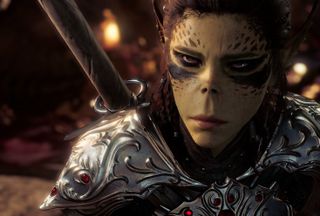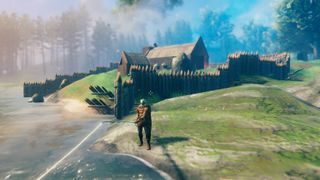The hardest decision in PC gaming today: when to play an Early Access game
There's always a trade-off between joining the conversation or waiting for a finished version.

Baldur's Gate 3 is right there. I'm looking at it on Steam, hovering my mouse over the buy button, and thinking about the 104 hours I spent playing Divinity: Original Sin 2, easily 2017's game of the year. I'm at the center of the bullseye for Baldur's Gate 3's target audience. But I can't bring myself to play it yet.
It's a unique PC gaming paradox in 2021: Playing something you think you'll like now might sour an experience you'll love later.
If I play the first part of Baldur's Gate 3 now, in Early Access, will I enjoy it as much? What if bugs or balance issues leech away my enthusiasm? Or what if I finish what's available in Early Access, lose all momentum by the time final release hits, and dread the timesink of starting over from the beginning? I might not even have a choice about starting over—plenty of Early Access games have had to wipe save files, and that's especially heartbreaking in an RPG. Early Access has become a great tool for game developers, but it's also made it harder than ever to decide when to play a new PC game.
In my personal time, I play old games more often than I do new ones. I spent December beating Sekiro and then playing a bunch of '90s shooters, rather than any of the great games released in 2020. But thinking about what games I decide to play when, especially when it's Early Access, has convinced me that there really can be a "wrong" time to play a game today. And often, that's a tough call to make.
Why do we decide to play a game when it's brand new, rather than waiting a few months or years? Our own excitement is a big part of it. Unless reviews change my mind, I want to play Elden Ring as soon as I can get my hands on it because I love FromSoftware's other games. The simplest decision here is time vs. money—I'd rather have that experience sooner than save $30 by waiting to buy the game on sale a year later. The more complicated factor is how important the conversation, or community, is to your experience. There was a blissful two weeks in 2020 when my whole social media feed was full of people enjoying Tony Hawk's Pro Skater 1+2. It's still a hell of a skateboarding game if you boot it up today, but you can no longer wade into that shared enthusiasm and water cooler talk.
We have to weigh these decisions when we go see (or, I guess, stream) new movies on opening night or listen to albums when they're brand new, but Early Access throws in a wild card unique to games. The immediate excitement of playing something has to overpower the knowledge that a game will almost certainly be better if we wait to click install for a year or two.

The unexpected success of Valheim this month is a perfect example. Chris loves it, and I trust his opinion on survival games because he's played almost all of them. Other members of the PC Gamer team who aren't normally big survival players are getting in on the fun, too, and grouping up on a server together sounds pretty great. But I wonder if we're going to run out of things to do pretty quickly. What happens when we hit Valheim's endgame? Does it even have one, right now?
The biggest gaming news, reviews and hardware deals
Keep up to date with the most important stories and the best deals, as picked by the PC Gamer team.
When my friends and I started playing Obsidian's survival game Grounded last year, we really liked its Honey I Shrunk the Kids vibe and how intuitive its building system was. But we ran through the game's existing story in about an hour, and playing more after that seemed premature. Some degree of progression is tied to the story, but it would also feel awkward to unlock everything in the current game and build up a fortress while narratively being stuck in the tutorial phase. We decided to shelve it until it leaves Early Access, but who knows if we'll actually go back to it.
It won't be a tragedy if we play some other game together instead. We'll still have fun. But the risk with Early Access is that a disappointing experience in an unfinished game could so easily turn us away from what would be a great experience later on.
Plenty of people simply don't play games in Early Access, instead waiting patiently for the full release, and generally I'd say that's a good idea. It's possible you miss out on the conversation. Besiege, one of the first Early Access games in 2015, gave us weeks of amazingly elaborate siege engines that were somehow always pensies. We traded animated gifs of exploding dickcraft for weeks. But Besiege felt pretty "been there, done that" by the time it was finally finished in 2020.
That's not how it always goes, though. Most games see a flurry of interest when they leave Early Access Look at Hades, which was playable for two years and then suddenly became one of the most beloved roguelikes ever once it was finished in September.

But I don't think it's always the right answer to wait. I played more of Satisfactory in 2020 than any other game, by far, and don't regret a minute of it—even though when the next big update releases, my factory-building partner and I will probably start over, giving up dozens of hours of progress through the tech trees and a huge stockpile of rare resources. It's going to be hard to go back to our existing build and remember where everything is, or modify it to suit changes the developers have made in the last year, and we know we can do everything way more efficiently starting over. But I don't think there are many other Early Access games I'd have that kind of enthusiasm for—usually the thought of losing many hours of progress would turn me off from ever going back.
This isn't a problem to be fixed, really. Early Access clearly works wonders for developers like Larian, who used it to hone Divinity: Original Sin 2 into a phenomenal RPG. Without that development process, Larian may never have been successful enough to work on Baldur's Gate 3, which now torments me with its half-doneness. It's just a value judgment we have to make far more in 2021 than we did five years ago, with more games than ever vying for our attention.
Sometimes it's better to wait, and sometimes it's better to give in to enthusiasm. I think the answer lies in knowing your gaming habits—is losing progress a deal-breaker? How vital is sharing your experience with others?—and likewise knowing your Discord group (if you have one) just as well as you know yourself. If you can guess that they'll yawn when you bring up playing Valheim in 2023, don't wait and regret it. Get the hell in there now. Just mind the deathsquitos.

Wes has been covering games and hardware for more than 10 years, first at tech sites like The Wirecutter and Tested before joining the PC Gamer team in 2014. Wes plays a little bit of everything, but he'll always jump at the chance to cover emulation and Japanese games.
When he's not obsessively optimizing and re-optimizing a tangle of conveyor belts in Satisfactory (it's really becoming a problem), he's probably playing a 20-year-old Final Fantasy or some opaque ASCII roguelike. With a focus on writing and editing features, he seeks out personal stories and in-depth histories from the corners of PC gaming and its niche communities. 50% pizza by volume (deep dish, to be specific).
Most Popular


